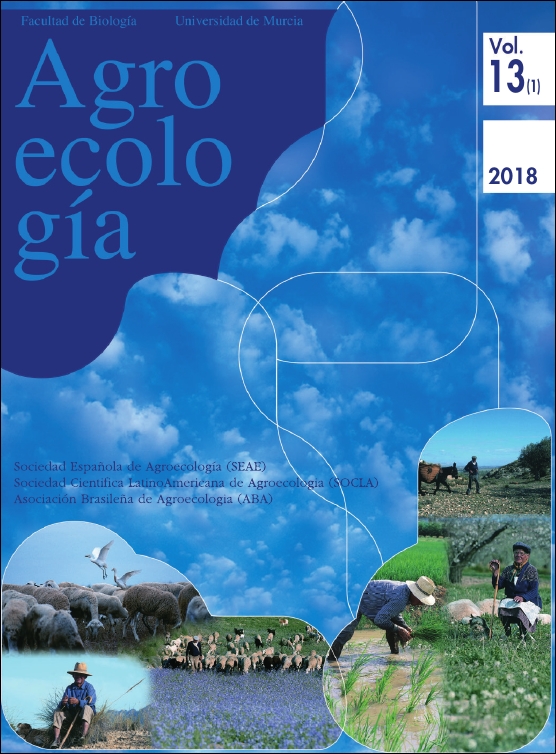La agroecología como investigación militante y feminista
Abstract
This paper analyzes Agroecology as an activist scientific approach, from its origins. We review those authors, that inspired the agroecological proposal, who questioned the neutrality of science and the hierarchy of knowledges from different epistemological angles. Authors that proposed ways to build, both in form and in practice, knowledges dialogues and ruptures of power hierarchies that were given between individuals and modes of knowledge. We highlight decolonial studies and feminist studies as the key origins of Agroecology which, in its origins, clearly emerged as a rupturist action research proposal, regarding the normal science, and as an activist scientific approach related to the rural and agrifood subalterns’ struggles.
Downloads
References
Adams C. 2012. A política sexual da carne:a relação en- tre carnivorismo e a dominância masculina. São Paulo, Brasil: Alaúde.
Amin S. 1973. Le developpement inegal. Essai sur les formations sociales du capitalisme peripherique.Paris, Francia: Editions de Minuit.
Anderson ES. 2004. Feminist epistemology and phi- losophy of science. En Zalta, EN The Stanford Encyclopedia of Philosophy. https://stanford.li- brary.sydney.edu.au/archives/sum2004/entries/ feminism-epistemology/ (fecha de consulta: 29 noviembre 2018)
Bonfill Batalla G. 1987. El México Profundo, una civili- zación negada. Mexico D.F. México: Grijalbo.
Bubrisk SI. 2009. Activist Learning vs. Service Learning in a Women’s Studies Classroom. En Human Archi- tecture: Journal of the Sociology of Self-Knowl- edge 7(3), Article 8.
Calle 2011. Democracia radical. Entre vínculos y utopías. Barcelona: Icaria.
Carson R. 1962. The silent spring. Boston, EUA: Houghton Mifflin.
Cavana ML, Puleo A, Segura C. 2004. Mujeres y Ecología. Historia, Pensamiento, Sociedad. Madrid, E Espa- ñol: Almudayna.
d’Eaubonne F. 1974. Le féminisme ou la mort. París, Fran- cia: Femmes en Mouvement.
De Sousa Santos B. 2014. Epistemologies of the South. Justice against Epistemicide. Londres, Reino Uni- do: Paradigm Publishers.
Expósito J. 2015. Asumir la crisis del Marxismo: sujeto política y estructura en el pensamiento de A. Badiou, E. Laclau y N. Moreno. Buenos Aires, Ar- gentina: Universidad de Buenos Aires;.
Fals Borda O, Brandao G. 1987. Investigación Participa- tiva. Montevideo, Uruguay: La Banda Orienta.
Federicci S. 2010. Calibán y la Bruja, Mujeres, Cuerpo y acumulación Originaria. Madrid, E Español: Trafi- cantes de Sueños.
García Roces I. Soler Montiel M, Sabuco i Cantó A. 2015. Perspectiva ecofeminista de la Soberanía Ali- mentaria: la Red de Agroecología en la Comuni- dad Moreno Maia en la Amazonía brasileña. Rela- ciones Internacionales 27: 23 - 38.
Gunter Frank A, Gills BK. 1996. The World system: five hundred years or five thousand? Londres, Reino Unido: Routledge.
Freire P. 1994. Pedagogía de la esperanza. Sao Paulo, Bra- sil: Paz e Terra.
Freire P. 1972. Pedagogía del oprimido. Buenos Aires, Ar- gentina: Siglo XXI.
Freire P. 1973. Teología de la Liberación. Sao Paulo, Brasil: Paz e Terra.
Freire 1977. Extensión o comunicación. Rio de Janeiro, Brasil: Paz e Terra.
Fricker M. 2003. Epistemic Injustice and A Role for Virtue in the Politics of Knowing. Metaphilosophy 34 (1- 2):154-173.
González Casanova P. 2009. De la Sociología del poder a la sociología de la explotación. Pensar América Latina en el siglo XXI. Bogotá, Colombia: CLACSO Coediciones-Siglo del Hombre.
Ibáñez J. 1985. Del algoritmo al sujeto. Perspectivas de la investigación social. Madrid, E. Español: S. XXI.
Kahn AP. 2006. The Encyclopedia of Stress and Stress-related Diseases. Nueva York, EUA: Facts on File, Library of health and living.
Konrad K. 2011. Lois Gibbs: grassroots organizer and envronmental health advocate. American Journal of Public Health 101(9): 1558-1559.
Mariátegui JC. 1994. Mariátegui Total, obras completas. Lima, Perú: Amauta;.
Merchant C. 1980. The death of Nature: Women, Ecology, and the Scientific Revolution. San Francisco, EUA: Harper & Row.
Reed E. 1975. Woman’s Evolution: From Matriarchal Clan to Patriarchal Family. Nueva York, EUA: Pathfinder Books.
Salazar MC. 1973. La expansión del capitalismo en el campo: sus consecuencias en la zona cafetera, Colombia y el departamento del Tolima. Bogotá, Colombia: OFISEL.
Salleh A. 1994. Naturaleza, mujer, trabajo, capital: la más profunda contradicción. Ecología Política 7: 35-47.
Shiva V. 1988. Staying Alive: Women, Ecology and Development. Londres, Reino Unido: Zed Books.
Shiva, V. 1995. Abrazar la vida: mujer, ecología y supervivencia. Madrid, E. español: Horas y Horas.
Shrewsbury CM. 1987. What is feminist pedagogy?. Women’s Studies Quarterly (special issue: Feminist Pedagogy) 15 (3–4): 6-14.
Streck D, Redin E, Zikoski JJ. (orgs.) (21015). Diccionario Paulo Freire. Lima, Perú: CEAAL.
Stavenhagen R. 1996. Indigenous rights: some conceptual problems. En Constructing democracy: Human rights, citizenship, and society in Latin America (Jelin E, Hershberg E, (eds). Boulder, EUA: Westview Press, pp 141-159.
Wallerstein I. 2004. World-Systems Analysis: An Introduction. Durham, North Carolina, EUA: Duke University Press.
Wangar, M. 2008. Movimiento cinturón verde, compartiendo propuestas y experiencia. Madrid, E. Español: Los libros de la catarata;.
Zea L. 1969. La filosofía americana como filosofía sin más. México: Siglo Veintiuno;
RECURSOS WEB
Las obras que se publican en esta revista están sujetas a los siguientes términos:
1. El Servicio de Publicaciones de la Universidad de Murcia (la editorial) conserva los derechos patrimoniales (copyright) de las obras publicadas, y favorece y permite la reutilización de las mismas bajo la licencia de uso indicada en el punto 2.
2. Las obras se publican en la edición electrónica de la revista bajo una licencia Creative Commons Reconocimiento-NoComercial-SinObraDerivada 3.0 España (texto legal). Se pueden copiar, usar, difundir, transmitir y exponer públicamente, siempre que: i) se cite la autoría y la fuente original de su publicación (revista, editorial y URL de la obra); ii) no se usen para fines comerciales; iii) se mencione la existencia y especificaciones de esta licencia de uso.
3. Condiciones de auto-archivo. Se permite y se anima a los autores a difundir electrónicamente las versiones pre-print (versión antes de ser evaluada) y/o post-print (versión evaluada y aceptada para su publicación) de sus obras antes de su publicación, ya que favorece su circulación y difusión más temprana y con ello un posible aumento en su citación y alcance entre la comunidad académica. Color RoMEO: verde.





